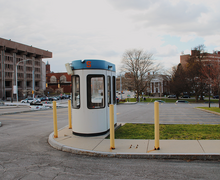Updated SPD Reform and Reinvention Plan focuses on transparency
Chenze Chen | Staff Photographer
A second version of the draft plan was released following feedback from the community and Common Council.
Get the latest Syracuse news delivered right to your inbox.
Subscribe to our newsletter here.
The city of Syracuse has released an updated version of the Syracuse Police Reform and Reinvention Plan, using feedback from the Common Council and the community to add commitments.
Deputy Mayor Sharon Owens and Syracuse Police Department Chief Kenton Buckner discussed the changes at the Common Council’s Public Safety Committee meeting Wednesday.
“The Common Council has really held our feet to the fire,” Buckner said. “We’ve had some tough conversations along the way, but I think we all should feel good about where we are today.”
The changes in the updated draft document focus on expanding measures of transparency and accountability. Here’s a breakdown of the updates:
Oversight committee
Owens announced that the city will establish an oversight committee with the goal of tracking the progress of police reform and ensuring that police follow through with plans effectively.
The eight-member committee, which Owens will chair, will consist of Councilor Chol Majok, of the 3rd District; Ranette Releford, administrator of the Citizens Review Board; and a law department representative. A representative from the SPD chief’s office will also serve on the committee alongside three members designated by the mayor’s office, Common Council and Owens.
“Next week, there could be a new law that comes through New York state or the federal government or locally that could affect the plan positively or negatively, and (the job of the committee) is to keep our heads around that as well,” Owens said.
She noted that the committee will also analyze and vet potential changes to the plan as time goes on. The committee will begin work by April 30.
The reform plan has also been updated to include specific deadlines for its goals.

Shannon Kirkpatrick | Presentation Director
Alternatives to police response
The plan elaborates on alternatives to policing models that the city is looking into, focusing on models for 911 response. The city has reached out to Broome County to investigate its model for response, which was one of the recommendations of the Onondaga County Police Reform and Reinvention Collaborative, Owens said.
Michael Greene, an at-large councilor who is running for mayor as a Democrat, asked if police response is needed in cases where social services may be better suited to handle the calls.
“In a scenario where there’s an individual sleeping on a park bench, should that even go to the police at all?” Greene said.
Buckner reiterated that police officers would “more often than not” respond to mental distress calls alongside or in place of mental health professionals, but the city is working with 911 dispatchers to prioritize sending mental health professionals to callers when needed, he said.
The police chief also committed to implementing all aspects of the Right to Know Act by April 1 and publishing the first quarterly report required by the act, which will outline the number of searches conducted by SPD, this summer.
Published on March 14, 2021 at 11:38 pm
Contact Nick: nickrobertson@dailyorange.com | @NickRobertsonSU






